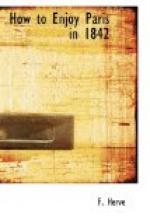All parties regard M. Guizot (Minister of Foreign Affairs) as a talented man; and one of considerable firmness of character, who unflinchingly maintains his ground whilst a host are baying at him, appearing as unmoved as the rock that is pelted by the storm; he seems never taken by surprise, but is ever ready with such answers and explanations as generally baffle his accusers; still he cannot be called a popular minister, because he is known to possess what is called the Anglo-mania, that is, to have a most decided predilection for everything that is English, and there is no doubt that he wishes to do all in his power to conciliate England, without sacrificing the interests and honour of his country; but in that respect his enemies think that he would not be too delicate, but is determined to have peace with England a tout prix (at any price). M. Guizot is a protestant and was a professor in the University.
His immediate opponent, M. Thiers, has risen to eminence entirely by his writings; he came to Paris from Aix in Provence (in 1820), and lived in a room on the fourth floor in the Rue St. Honore; here he wrote for the newspapers, but being taken by the hand by M. Lafitte he and his works speedily rose into notice; it is possible that he may be as anxious for the welfare of his country as M. Guizot, but would carry things with a higher hand, and although every one is aware of his extraordinary abilities, yet the moderate and thinking part of the community remember how near he was involving France in a war with her most powerful neighbours, and however they smarted for a time under what they conceived an affront offered to their country, yet there are very few now but feel fully sensible of the benefits they derive from the blessing of peace having been preserved. M. Thiers may be cited as one of the most animated and effective speakers of any in the Chambers, and his speeches often display a brilliance, energy, and ardour, which create a forcible impression, but sometimes betray the orator into hasty assertions, of which he may afterwards repent, but feeling too much pride to recant, he prefers standing by the position he had hastily assumed; consequently,




